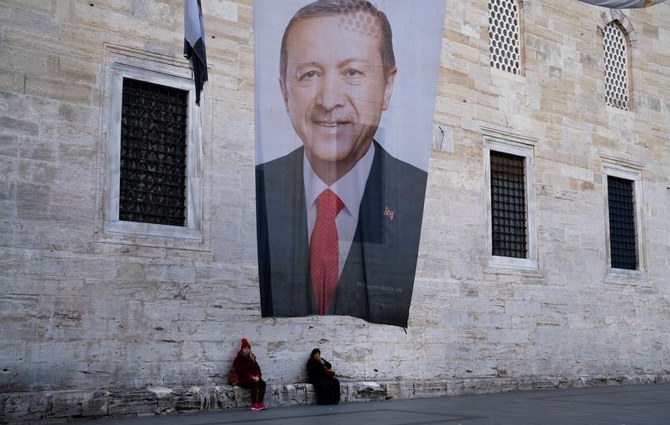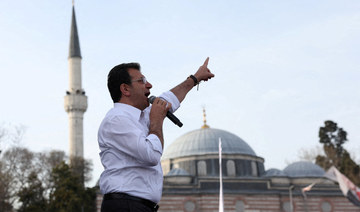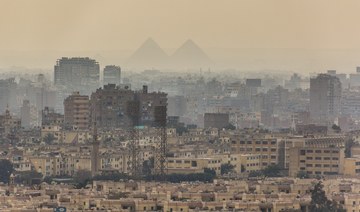ANKARA: After millions of Turkish voters went to the polls on Sunday to elect local authorities in 81 provinces, the ruling Justice and Development Party, or AKP, suffered a major blow as the main opposition CHP scored victories across the country, consolidating its control in conservative strongholds with its biggest victory since 1977.
Experts suggested Sunday’s vote was a barometer of the national feeling among voters who have long struggled with a severe cost of living crisis.
The main question of the mayoral election was whether incumbent Istanbul Mayor Ekrem Imamoglu, 52, an arch-rival of President Recep Tayyip Erdogan and a charismatic leader in his own right, could secure re-election in the city of 15.7 million people, against rival Murat Kurum, 47, the AKP candidate and the country’s former urbanization minister.
Erdogan, who was mayor of Istanbul himself between 1994 and 1997, once claimed that whoever wins the city will be able to dominate the whole country in a general election.
With a third of Turkiye’s economic output and 18 percent of the country’s population, Istanbul’s annual budget is $16 billion.
In the last local elections in 2019, Turkiye’s united opposition won the main cities of Ankara, the capital, and Istanbul, the commercial hub, ending the ruling party’s 25-year reign.
After Sunday’s vote, the main opposition CHP became the leading party, controlling 36 of the country’s 81 provinces.
Erdogan, 70, conceded defeat, saying: “March 31 is not an end for us, but a turning point.”
The president’s current term of office expires in four years. The AKP’s loss of votes nationally and defeats in major cities are expected to prevent it from initiating new constitutional changes that would allow Erdogan to rule beyond 2028.
Turkiye’s next elections will be held then, barring a snap election or referendum.
Imamoglu’s re-election is also expected to unite the Turkish opposition, as he is seen as a possible future challenger to Erdogan and the opposition’s best chance of regaining the presidency.
The incumbent mayor of Ankara, Mansur Yavas, also retained his position by a large margin.
Murat Somer, a political scientist at Istanbul’s Ozyegin University, said Turkish voters had given a big red card to the Erdogan government’s “authoritarianism and economic policies,” while rewarding opposition politicians who have been willing to reform since the May elections, punishing those who have been caught up in infighting.
“In return, Turkiye’s opposition parties have shown remarkable resilience and ability to regenerate despite a very uneven playing field in favour of the government. Ekrem Imamoglu has emerged as the new leader of the opposition and an agent of change for the next decade,” he told Arab News.
Turnout was around 76 percent, with some 61 million people eligible to vote, a significant drop from last year when 87 percent of voters cast their ballots. The decline in votes for the AKP is also partly explained by the emergence of several right-wing and Islamist parties to compete with it.
According to Somer, if Imamoglu can turn the broad coalition he has formed in Istanbul into a Turkiye-wide coalition, he may just be able to steer Turkiye onto a new and more inclusive course of economic development, peace and secular democracy.
“The most important aspect of this process is that it is a bottom-up rather than a top-down process. Large parts of the electorate of the ruling AKP, the right-wing IYI party and the pro-Kurdish Dem Parti seem to have voted against their party’s preferences and in favour of an ethnically, culturally and ideologically inclusive national alliance for democracy and change,” he said.
Somer also believes that the impact of this new local fault line on Turkiye’s political future will depend on how Erdogan and his party interpret the electorate’s message.
“It is less likely that he will go against the will of the people, because despite all the authoritarianism, the principle of popular sovereignty is well established in Turkiye. These results suggest that opposition parties should follow the lead of the electorate in forming coalitions rather than the other way around,” he said.
Berk Esen, a political scientist at Sabanci University in Istanbul, agrees that this is a historic victory for the country’s main opposition camp.
“Much of the media was under government control, and 17 government ministers used taxpayers’ money to campaign for the government candidates in Istanbul,” he told Arab News.
“And so, the CHP candidates, who were fighting an uphill battle, ended up winning all over the country, even in some conservative strongholds, like Adiyaman, almost doubling the number of provinces it controls and increasing its share of major municipalities from 11 to 15. This is truly historic,” he told Arab News.
Esen believes it will be very difficult for Erdogan to stabilize Turkiye’s competitive authoritarian regime in the future.
“I don’t expect him to go for early elections, even if the opposition asks him to do so. He may try to stabilize Turkiye’s economy, but given how much the current economic policies have minimized the AKP’s base in this election, it is difficult to really see how much longer such policies can continue. And even if the economy is managed, the Turkish economy will not necessarily see the phenomenal growth rates we saw in the 2000s,” he said.
The Turkish economy grew by 4.5 percent last year, according to official statistics, and inflation is soaring to almost 70 percent.
With Turkiye’s main local governments now controlled by opposition mayors, many of whom have increased their margins of victory, Esen believes it will be difficult for Erdogan to disrupt their municipal services.
“It will also be very difficult for Erdogan to impose his will and for civil servants, judges and journalists to act in a partisan manner,” he said.
The CHP “will also speak out against violations of freedoms, political rights and probably on the Kurdish question. I don’t think the election results will push Turkiye in a more authoritarian direction,” he added.
Esen also expects some power struggles within the AKP with Erdogan, which could see many people purged from the party.
Esen believes that the election results have highlighted several key points.
“First of all, the candidates matter. The opposition ended up with some really credible candidates in Istanbul and Ankara at the district level, who reflect the electorate they want to represent,” he added.
“On their side, the government has pursued a tight monetary policy, as opposed to pushing for an expansionary fiscal policy as we saw in the run-up to the presidential and parliamentary elections last year. I think that played a really big role as well,” Esen said.
Meanwhile, experts stress that the drop in turnout could be explained by the disillusionment of many pro-government voters over the ongoing economic downturn.
For Esen, Sunday’s election results could also be a new step toward a presidential bid.
Yavas and Imamoglu may consider running for president as of today, he said.
They both have “different political profiles and appeal to different segments of the Turkish electorate. I think they will start building a nationwide campaign,” he said.
Esen expects this to be Erdogan’s last election.
“Because I am not sure if he will be able to run such an effective campaign against these two formidable politicians. But we will also see a transition to a parliamentary system at some point, because Erdogan does not want to hand over so much power to the opposition. It is also an interesting question to explore,” he said.






























